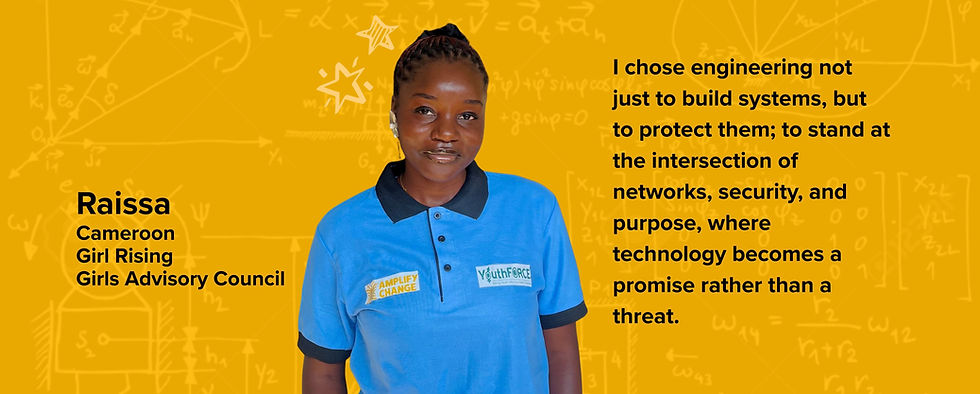Transforming Girls' Education through the Power of Stories
- Jun 12, 2023
- 3 min read
Updated: Jun 13, 2023
By Nidhi Shukla, President of Girl Rising

In the Kibera settlement just outside Nairobi, Kenya, I had the joy of meeting with Mary, a remarkable young woman who has been a part of the Girl Rising program through our partner Sunflower Trust. Despite regular interruptions to her education over the past few years caused by economic hardship, domestic violence, and the pandemic, Mary is now thriving in high school. Her Head of School recognizes her “exceptional leader” and is now looking to Mary for guidance on integrating the Girl Rising life skills program into the school's curriculum. Mary is part of a global community of young women who, through Girl Rising’s programming, have found their voice, gained agency, and developed social-emotional skills, advocating for themselves and their peers.
Stories like Mary's are not unique. Across the globe, girls in our programs are standing up to gender norms and limitations that could hold them back. Girls like Jyoti in India, who uses street theater and peer-led creative activities to raise awareness about period poverty and fight for inclusive menstrual health education - and Hafsa in Pakistan, who supports women-led families displaced by devastating floods, helping them rebuild their lives and access educational resources for their children.Their resilience and determination is driving change in their communities and beyond.
At Girl Rising, we work in regions where gender inequities are stubbornly ingrained, including my home country of India, which currently ranks 135 out of 146 on the Gender Equity Index. Yet, through the power of storytelling, we have helped to address significant barriers to girls' education. By sharing the stories of Azmera, Wadley, Ruksana, and other girls from our films, girls in our programs have discovered their aspirations, understood their rights, identified role models, and developed important life skills. They’ve also learned to tell their own stories, which have become powerful tools themselves, shaping their identities and motivating them to pursue a quality education that will transform their lives and the lives of their families and community members.
When I joined Girl Rising nine years ago, my goal was simple: to break down the barriers that hinder girls' access to education. As someone who had challenged traditional gender roles in my own life, education was the key to forging my own path, rejecting traditional roles I was expected to play and instead developing a career fighting for equity and justice. When I saw the opportunity to work with Girl Rising and use stories to change hearts, minds, and policies, I grabbed it with eagerness, curiosity, and deep determination.
In those early days, we took the Girl Rising film to diverse settings - rural classrooms, bustling markets, humble porches, business conference rooms, and prestigious government stages. These screenings sparked real and surprising conversations. They kindled a deep understanding of the value of educating girls. They helped to build a movement for girls' education worldwide.
As the newly appointed President of Girl Rising, my determination to continue this work burns brighter than ever. Yes, there’s been measurable progress in legislation and funding, but we now face unprecedented challenges. Climate change, global conflicts, and displacement loom large, threatening the futures of millions of girls. Gender-based violence, trafficking, and forced marriages are all on the rise in areas most impacted by this new wave of challenges. A United Nations Development Programme report released this month shows that gender biases remain deeply entrenched, harming economic development, education and job opportunities and advancement of human rights. We cannot afford to allow the movement for girls' education to regress.
Last month, I participated in the International Education Funders Group in Edinburgh, where we explored how philanthropy can drive systems change to transform girls' education. Systems change refers to identifying the root problem, by analyzing and transforming different parts of a system and how they interact.. For girls to gain equitable access to opportunities, several structures need to shift. They include communities’ perceptions of girls and women, adolescents’ access to platforms for expressing their thoughts and opinions, government solutions to alleviate gender barriers, and school administrations that nurture equity. As we move into the second decade of Girl Rising, we will leverage systems change approaches to illuminate on the intrinsic links between girls’ education and vital issues including sexual and reproductive health, mental health and wellbeing, climate change among others. We will continue to use storytelling to not only tell stories of adolescents confronting barriers, but to also showcase role models and stories that stir hope and optimism.
Taking on the role of President fills me with humility, excitement, and profound gratitude for our dedicated partners. Throughout this journey, I wholeheartedly commit to harnessing storytelling to realize our vision of a world where all girls can learn, rise, and thrive.




Comments